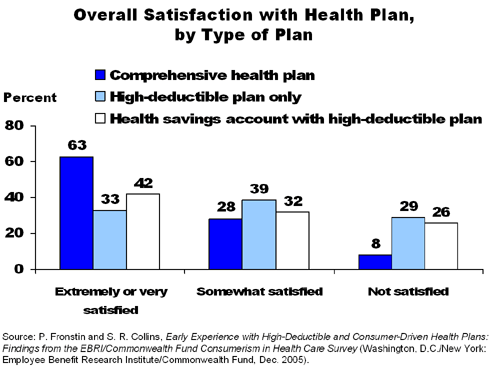Americans enrolled in "consumer-driven" health care—a new type of health coverage designed to make people more cost-conscious—are less satisfied with their health plans than those with comprehensive health insurance, a new survey finds.
The EBRI/Commonwealth Fund Consumerism in Health Care Survey is the first national study to examine the early impact of these new health plans. Typically, people with consumer-driven coverage combine a special tax-exempt medical savings account used for non-covered expenses with a high-deductible health plan that covers costs over a specified threshold. The study included two types of accounts: health savings accounts, to which employers and employees can contribute pre-tax income, or health reimbursement arrangements, to which only employers can contribute. Deductibles for the insurance plans range from $1,000 or more for individuals to $2,000 or more for families.
Consumer-driven care has been described as the latest "big idea" in health insurance. Proponents think they will encourage individuals to become more astute consumers of medical care. But critics worry that high out-of-pocket costs will discourage use of needed health services, especially among people with low incomes and/or chronic conditions.
In a report based on the survey's findings, Early Experience with High-Deductible and Consumer-Driven Health Plans, analysts Paul Fronstin, Ph.D., of the Employee Benefit Research Institute (EBRI) and the Fund's Sara R. Collins, Ph.D., say that individuals covered by consumer-driven plans, with or without health savings accounts, are more likely than those with comprehensive insurance to avoid or delay needed care. About 35 percent of individuals enrolled in both a health savings account and a high-deductible plan and 31 percent in high-deductible plans alone reported delaying or avoiding care. By contrast, 17 percent of those covered by comprehensive health plans reported the same experience.
When they do get care, those in consumer-directed plans often encounter financial burdens. More than two-fifths (42%) of people with high-deductible plans and nearly one-third (31%) who also have health savings accounts spent 5 percent or more of their income on out-of-pocket costs and premiums in the past year, compared with one of 10 (12%) in comprehensive health plans. Such higher costs likely go a long way in explaining why only 42 percent of consumer-directed plan enrollees were "extremely" or "very" satisfied with their health plan, compared with 63 percent of respondents with comprehensive health insurance.

Americans with consumer-driven coverage do seem to exhibit cost-conscious behavior in their health care decisions, the survey found. But as Fronstin and Collins note, "cost-related reductions in demand are highest among those with the most to lose—those who are sick and those who have low incomes." Moreover, very few respondents to the survey reported having information about cost and quality needed to make informed decisions.
"Cost-conscious decision making is one advantage of consumer-driven plans," says EBRI's CEO, Dallas Salisbury. "But the perception of those who are enrolled is that these plans do not provide the tools and resources to make decisions and that they reduce use and increase out-of-pocket spending."
Still, employers have expressed considerable interest in the new plans in hopes they may help rein in health care costs. The survey found that 1 percent of privately insured U.S. residents ages 21 to 64 are enrolled in a consumer-directed plan, while another 9 percent are enrolled in an high-deductible plan without an associated savings account. Both types of plans are expected to grow next year.